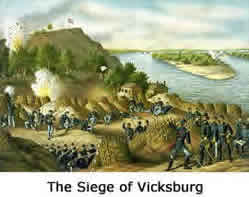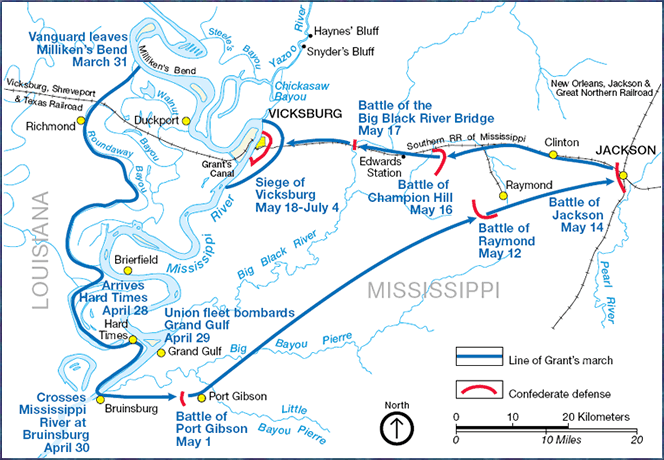The Vicksburg Campaign
Copyright © 2007, Henry J. Sage
Vicksburg was vital to the Confederate cause. As long as the Mississippi was under Confederate control, Arkansas, Western Louisiana and Texas could effectively support the Confederate cause. Beef from Texas were shipped east to help supply Lee's armies needs. The port city of Matamoros in Mexico, just across the border from Texas, allowed the Confederates to import weapons and other supplies from England which were then transported east via the railroad leading out of Vicksburg. Loss of the Mississippi River would cut off those critical assets to the rest of the Confederacy.
For those reasons, Vicksburg was extremely well defended, with state-of-the-art strong points that included trenches and parapets from which artillery and riflemen could fire. The city sat on a bluff several hundred feet above the river, and was bordered on the north by swamps and on the south by steep hills. The fortifications covered all but the river side of the city. Inside the fortress 35,000 men under the command of General John C. Pemberton were prepared to defend fortress of Vicksburg. General Pemberton was in a touchy position, being a Pennsylvanian fighting for the South. His loyalty to the Confederacy stemmed from the fact that his wife was a Virginian. He was determined that his behavior on the battlefield would demonstrate that his loyalties were not divided. Facing grant would be a severe test for Pemberton
Grant's campaign to take Vicksburg did not start auspiciously. His base of operations was in Memphis, some 250 miles to the north. Grant began his campaign by moving east from Memphis to a supply base in Holly Springs, about 40 miles southeast of Memphis in North Central Mississippi. From there he moved south through the central part of Mississippi, but he relied upon the timeworn principle that an army must always keep its supply lines intact, a lesson he had learned in Mexico. Harassed by the cavalry of General Bedford Forrest, Grant found himself uncomfortably strung out from his supply base, and after a Confederate raid on Holly Springs unnerved him, he retreated back to the vicinity of Memphis. [See map]
 Grant was a determined officer, however, and did not sit waiting for something else to happen. Instead he began a series of operations designed to get at Vicksburg by one means or another. He tried sending gunboats with his troops through the bayous and swamps along the Mississippi in order to find a viable approach Vicksburg. But the heavy growth of trees and brush along with harassment by Confederate snipers as his men tried to chopped their way through the shallow waters frustrated virtually every attempt. When General Sherman tried to assault the northern part of Vicksburg just before Christmas, 1862, via one of those bayou expeditions, he was thrown back rudely.
Grant was a determined officer, however, and did not sit waiting for something else to happen. Instead he began a series of operations designed to get at Vicksburg by one means or another. He tried sending gunboats with his troops through the bayous and swamps along the Mississippi in order to find a viable approach Vicksburg. But the heavy growth of trees and brush along with harassment by Confederate snipers as his men tried to chopped their way through the shallow waters frustrated virtually every attempt. When General Sherman tried to assault the northern part of Vicksburg just before Christmas, 1862, via one of those bayou expeditions, he was thrown back rudely.
Grant also tried advancing through the bayous on the far side of the river across from Vicksburg, but also to no avail. In the spring of 1863 he even sent Sherman's men to dig a ditch that would reroute the Mississippi River so that he could get by the Vicksburg gun batteries without serious casualties. The river would not cooperate and refused to flow through “Grant’s ditch.” (Ironically, in the summer following the war during a great thunderstorm, the Mississippi actually began to flow as Grant had hoped it would. Grant's ditch is still visible from the city of Vicksburg to this day.)
Grant then called his senior commanders together to discuss another plan. He decided to have Foote carry his army across the Mississippi and then march down the western bank of the river. Meanwhile, he would have Flag Officer Foote float his transports and gunboats down the Mississippi past the Vicksburg batteries under cover of darkness. Once south of the city, Grant would use the transports to carry his army back across the river, move inland and attack Vicksburg from the land side. Generals Sherman and McPherson were skeptical of the idea but had faith in Grant’s vision. Much of Grant's success lay in the fact that he trusted his own judgment, even when some of his trusted subordinates disagreed with him.
Foote floated all but one of his boats by the Vicksburg batteries, and Grant got his army back onto the Vicksburg side of the river well south of the city. Cut off from his base in Memphis, Grant now took a daring step. Instead of trying to keep connected with a supply base on the river, he had his soldiers round up all the supplies, wagons and animals they could find and took his supplies with him. They would live off the land. When he cut loose from the Mississippi, he was completely out of touch with the rest of the Union. Lincoln feared that Grant had made a terrible mistake, and when he heard nothing from the general for 18 days, he anticipated only the worst.
Grant’s campaign took him in the direction of Jackson, the capital of Mississippi. [See Map] Waiting in Jackson with about 25,000 men at his disposal in Mississippi was Confederate General Joseph Johnston, who was suffering from wounds and was not feeling particularly aggressive. He and Pemberton communicated with each other to try to determine a plan to defend against Grant, but Grant was moving rapidly. Grant sent a cavalry commander, Col. Benjamin Grierson, on a raid from Holly Springs to the north all the way to Baton Rouge in the South, during which Grierson's cavalry troopers uprooted railroad tracks, cut telegraph lines, destroyed supplies and generally led Confederate cavalry on a merry chase. Grierson's action, along with the fact that Grant had a spy in the Confederate Army who kept him informed, helped Grant defeat Johnston's attempts to communicate effectively with Pemberton, and also kept him reasonably well informed of how the two Confederate generals planned to defend Vicksburg.
When General Johnston became aware that two corps of Grant's army were approaching Jackson, he ordered the city evacuated, leaving only a minimal defense to slow Grant's advance. The Union Army had no difficulty taking the city within hours of attacking. Grant himself moved into Jackson as his troops burned part of the city and cut off railroad connections with Vicksburg. From there Grant turned his attention towards Vicksburg to the West, leaving a small blocking force to guard against Johnston.
Pemberton decided that his best course of action was to come out from Vicksburg and face Grant. He had attempted to attack Grant's supply lines, but discovered that there was nothing there, since Grant had taken all of his supplies with him. Pemberton soon realized that Grant had positioned his entire army between Vicksburg and the city of Jackson. Pemberton's men advanced to a place called Champion’s Hill, and there the two armies fought fiercely. In the end Grant's stronger army handily repelled Pemberton's Confederates.
Pemberton made another stand along the Big Black River, but again Grant's forces, knowing that they were in deep in enemy territory and would have to fight their way out one way or another, were in good spirits. They drove the Confederates back once more, and Pemberton's men retreated into the powerful fortifications of Vicksburg. Grant attempted a frontal assault on the city, but the defenses were too strong, and his unsuccessful attempt cost him heavy casualties. His troopers wanted to try it again, and although he had doubts about its possibility of success, he decided to let them try once more. Again they were brutally repulsed. At that juncture, Grant was supposed to have said, “I guess we'll have to dig our way in.”
 Thus commenced the siege of Vicksburg, which lasted 45 days. Grant's army on the northern flank moved back around the defenses to regain contact with the Mississippi, allowing Grant to obtain food and other supplies for his troops and ammunition for his artillery. Gunboats blasted the city from the river side, and Grant's artillery began round-the-clock bombardments that reduced the defenders of Vicksburg to keeping their heads low and hiding in caves. Completely cut off from the rest of the world, Vicksburg’s supplies began to dwindle, and Pemberton's men found that they had little to eat and even had difficulty getting fresh drinking water. The citizens of Vicksburg suffered the same deprivations as the Confederate Army. The situation quickly grew dire.
Thus commenced the siege of Vicksburg, which lasted 45 days. Grant's army on the northern flank moved back around the defenses to regain contact with the Mississippi, allowing Grant to obtain food and other supplies for his troops and ammunition for his artillery. Gunboats blasted the city from the river side, and Grant's artillery began round-the-clock bombardments that reduced the defenders of Vicksburg to keeping their heads low and hiding in caves. Completely cut off from the rest of the world, Vicksburg’s supplies began to dwindle, and Pemberton's men found that they had little to eat and even had difficulty getting fresh drinking water. The citizens of Vicksburg suffered the same deprivations as the Confederate Army. The situation quickly grew dire.
Just as Grant was about to try to blow up the Vicksburg defenses by having his miner engineers tunnel under the fortifications, Pemberton decided that he and the city had had enough. He called for a truce and he and Grant came to terms. Grant allowed Pemberton's army, what was left of it, to be paroled, and equally important, he immediately had supplies brought into the city to feed the famished population. Pemberton surrendered on July 4
Lincoln, who along with Jefferson Davis had grown up in the Mississippi Valley, was elated by the capture of Vicksburg, for he understood exactly what control of the Mississippi meant to the Union, and what the loss of the Mississippi would cost the Confederacy. The southern armies could no longer depend upon support from the West or from supplies smuggled into Mexico and across the border into Texas. The Confederacy was now confined to the area east of the Mississippi, which meant that the Union could strengthen the blockade around the Southern coast from the Virginia capes to New Orleans. The noose was beginning to tighten. Upon hearing the news of Grant's victory, Lincoln said, “Once again the fathers of Waters flows unvexed to the sea.”
For military historians, Vicksburg was the great turning point of the war. Back in 1861 the aging General Winfield Scott, who was later rudely nudged out of office by the ambitious young General McClellan, had outlined a strategy to bring the Confederacy to its knees. The so-called “Anaconda plan,” which what is widely derided in the press, was designed to have Union forces surround the Confederacy, isolate, divide and then conquer it. Scott's idea eventually won the war. Vicksburg was a major component of Scott's plan.
In the spring of 1864 General Grant was promoted to the rank of lieutenant general, the first United States officer since George Washington to hold that exalted rank. President Lincoln placed Grant in command of all Union troops, in the last phase of the war was about to begin.

Grant's Vicksburg Campaign
| Civil War Home | War in the West | Civil War 1863 | Updated June 20, 2017 |